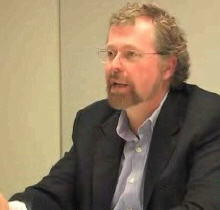Nathan Myhrvold: Invention capitalist


Intellectual Ventures Myhrvold has 18 patents to date and more than 100 pending, and Intellectual Ventures has one patent granted with close to 400 pending).
Myhrvold thinks the U.S. patent system is the best in the world, and that the patent system is a race. The first to file and get approval holds a more winning hand in the patent poker game.
In a speech given at the U.S. Capitol on March 3, titled "Invention: The Next Software," Myhrvold said:
...it turns out that almost all patent lawsuits are between two companies over a product. The bulk of patent lawsuits are midsize companies suing each other. Two percent of patent lawsuits over the last five years are due to entities that, as far as we can tell, have licensing as their primary business. And I’m not saying they’re trolls, that they’re bad, by the way, but no matter what you think of them, good or bad, it’s only 2 percent. And because someone –if someone makes a fact-based argument patent trolls are overwhelming us, okay, tell us the case numbers; we’ll look up the dockets. If you really think that it’s out of control, prove it.
In fact, if you look, many of the people that are active in describing patent trolls lose cases on an annual basis to completely upstanding companies that were pioneers in their field, often fell on hard times and now are trying to make do. But these are people that certainly tried extremely hard to make products and just didn’t succeed. And, you know, the patent system is a race. This is a very important point. You know, the Winter Olympics, they give the gold medal to the man or woman that gets to the bottom of the hill fastest, and that’s how the patent system works. That’s how scientific research works. So they call it Newton’s equations or Einstein’s equations because they published first. It’s a race to be first. That’s what motivates scientists.
Well, in many cases in business, someone gets there first, but they’re a university or they’re an independent, or they’re a start-up company that later fizzles. And then later on a big, powerful company, five or 10 years later – the little company tried to do it before it was ready. It was not ready for prime time or they were ahead of their time. They failed. So the big company comes later and says, look, I ought to be able to use that stuff, because now 10 years later it’s feasible, it’s profitable, it’s mainstream.
Well, in Olympics you give the medal to the guy that got there first, not the guy that got there richest. Okay, it’s very much like saying, in the Olympics, hey, don’t give the gold medal to them; they don’t have any endorsement contracts. Let’s go to the person who has all the endorsement contracts; they’ll use it better. That’s not the way you create a stable economic incentive for people to strive to invest time and energy before others.
In a recent Wall Street Journal op-ed, he gave his perspective on the current patent laws:
The patent system exists to give economic incentive to create inventions -- not products. After all, profit is the incentive to create and sell products. In order to have a level playing field, inventors must have a full set of rights, regardless of whether they are big or little, or whether they make products or just invent. Those rights are what give them the incentive to work long and hard on new ideas that may not work. A lot of big innovative companies agree with this -- companies like DuPont, GE, Qualcomm and 3M, as well as the pharmaceutical and biotech industry, have filed amicus briefs in support of MercExchange and equal rights for all inventors.
Weakening patent laws, whether in the Supreme Court or Congress, is no more than a government bailout of the infringement problems big tech companies deliberately made for themselves. America needs to have future generations of inventions and technology. We can't mortgage our future by taking away the rights and incentive of our inventors.
Myhrvold's company also filed an amicus brief in support of the MercExchange patent claim, which accuses eBay of patent infringement through the "Buy it Now" feature on the auction service. The U.S. Patent and Trademark Office recently upheld an earlier decision in a preliminary finding that the MercExchange patent was obvious and should not have been issued, and the Supreme Court recently heard oral arguments in eBay's appeal of the MercExchange patent claim.
Patents are a murky territory, and separating the trolls from the legitimate patent/intellectual property holders is not easy. A few weeks ago tiny NTP got $612 million from RIM in a patent dispute. This week Burst.com said it may sue Apple for patent infringment on the tiny company's (two people and 10 patents) patents dealing with fast transmission of content, such as music and video. Burst.com got $60 million in a settlement with Microsoft in March 2005 in a similar patent dispute. Is Burst.com a troll or underdog, asks the headline in BusinessWeek's story on the patent holder. There isn't an easy answer, but "invention capital" sounds like a good albeit contentious business. The patent spoils may come down to who has the best lawyers, most money and presentation skills, not who is first or most inventive...